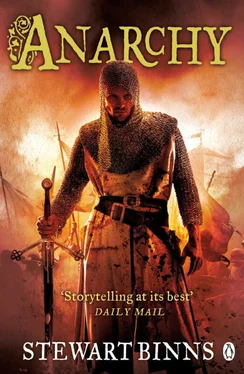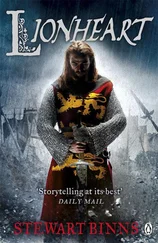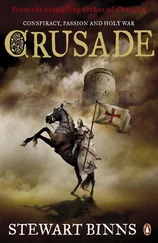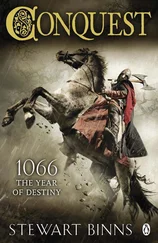The days are getting shorter and the wind colder. The Thames has taken on that brooding look it gets through the dark days of winter. Today my journey back from St Paul’s was agonizingly cold. The wind on the river sprayed water over me for the entire journey and the oarsmen struggled against the wind and the flow so much that they had to rest at Chelsea Reach for twenty minutes to get their breath.
Perhaps foolishly, but it is a cold evening, I have let the young monks light a small fire in the cloister to roast some chestnuts. It is a jovial way to spend a cold evening, but I don’t think my Dean will approve. Even so, it warms the bones and the soul a little.
My scribes are already complaining about their workload, and yet we are only at the beginning of Harold’s story. He is now heading towards your homeland; unlike me, at least he will soon be in warmer climes.
Yours in God, Gilbert
We soon found passage on a Breton trader from Bristol to Fécamp. It was a long and difficult journey with some fierce weather to contend with off the Cornish coast, especially around Lizard Point, where we had to take shelter for several days. We made better time after that with a good westerly behind us in the Channel. We got our land legs back in Fécamp, where Eadmer and Toste were both able to eat properly again after days being as sick as dogs during the crossing.
We were in Rouen within days – the seat of government of our Norman masters, and a place that had figured prominently in my family’s history. Normandy was everything I had expected it to be. My mother could speak several languages and had taught me the language of our lords and masters from an early age. An upbringing among Norman craftsmen and clerics had shown me their many virtues as builders of fine monuments and as devout Christians. But I had also been witness to their proclivity for violence and cruelty, and to the ruthless behaviour of their soldiers and lords. Their homeland reflected my experience of their presence in England, studded by towering testaments to their pride; it was an unyielding place, unforgiving of its enemies and of any of its own miscreants who broke the law or slighted its hierarchy.
We spent some time in Rouen observing the ordered and disciplined city, and I also made another excursion. This time not to a family shrine, but many miles to the west of Normandy, to Tinchebrai, a remote, heavily wooded valley, to see the site of the battleground where, ten years earlier, my father had fallen in the service of Robert Curthose, Duke of Normandy, on that fateful day when Robert lost everything to Henry Beauclerc.
My father had no known grave, but I knew from those who witnessed his demise on the field that he had been mortally wounded by a lance through his chest. Sadly, no one knew what became of his body, so I walked around the site looking for the remnants of the mass graves that had been dug for the dead. The local people helped me identify several mounds of earth, and I used my instincts to select a spot that might be his final resting place.
I had brought a small silver crucifix with me from Norwich, which the old Bishop, Herbert de Losinga, had blessed for me. I dug a small hole on the top of the mound for the cross and said a prayer in memory of the noble Sweyn of Bourne, the father I never knew. I had been a boy of eight when he died, and there had been times in my childhood when I resented the fact that my father had never visited us in Norwich. But my mother always reassured me that he loved me very much. She emphasized that personal sacrifice was at the heart of our family’s legacy. My grandfather’s generation was prepared to sacrifice everything for England’s just cause, and my father had given his life to protect his brother-in-arms, Robert Curthose.
She would always remind me how part of that sacrifice often involved the denial of the normal pleasures of life, how she was denied the presence of her father for many years and had no idea of his fate or whereabouts, and how my father’s loyalty to Robert Curthose consumed his entire life.
I thought about how loneliness must be one of the greatest trials of a life devoted to a cause. Was I prepared for such a burden? Would I be prepared to die for a cause, or to save the life of another, like my illustrious predecessors?
These were questions I could not yet answer with any certainty. But I knew that my chosen path meant that, one day, I would be able to.
My duties in honour of my family done, and in a much better frame of mind than when I left Norwich, we began our long journey to the Holy Land.
Our first port of call was Paris. Like London, an ancient Roman city of fine buildings, it was bursting with merchants and artisans, busy with their trade and products. The lord of Paris and the French was King Louis VI, ‘Louis the Fat’ to his subjects. Perennial enemies of the Normans – their neighbours just a few miles to the north – we joined one of the King’s squadrons as mercenaries to see how they trained and fought. After several weeks of slack and ill-disciplined training, with no military adventures in the offing, we decided to move on. But not until after an incident had occurred that would sound an ominous echo much later in my journey.
We were drinking in a hostelry by the banks of the Seine, a fine river not unlike the Thames in London, when two knights walked in with the swagger of men of some importance. They were fearsome-looking characters who had the aura of seasoned warriors – indeed, so much so that the loud noise of animated conversation and banter among the drinkers dropped noticeably as they sat down.
For a few minutes, we paid them no more attention until sudden shouts made us turn round. As we did so, one of the knights, the larger of the two, got to his feet and raised his sword to deflect a blow from the sword of an assailant bearing down on him. In the same instant, he raised his Norman mace high above his head and brought it crashing down on to the helmet of his attacker. It was a mighty blow; the helmet all but disintegrated and blood spewed down the face of its hapless wearer, who collapsed to the ground in a heap. The victim did not move. I suspect he was dead before he hit the floor.
Blood had splashed across our table and our instincts made us jump to our feet and draw our swords. As we did so, the imposing knight turned to face us, quickly followed by his companion. I held my sword at arm’s length, no more than a yard from the knight. I will never forget the look on his face. He was totally calm – as if he had just got up to leave, rather than having brutally crushed the skull of an opponent. He looked at me carefully before speaking in perfect Norman.
‘Your name, Sir Knight?’
‘Harold of Hereford.’
‘I have no argument with you. You may sheath your weapon.’
He smiled at me benignly – like a priest comforting one of his flock – and, with his companion in his wake, walked away before I could reply. As the landlord carried away the body of the stricken man, I asked him the name of the knight who had killed him.
His answer was blunt.
‘If you want to know his name, go and ask him. But if I were you, I’d leave well alone.’
‘I’m only asking you for his name.’
‘I don’t know his name; he’s a knight from Champagne, and the other one is from further north. They are veterans from the Great Crusade and have been causing trouble for months. They say they are God’s avenging angels, sent to punish evil-doers.’
Eadmer and I helped the landlord haul the body into the alleyway. After he had sent a young boy to alert the city’s garrison to the killing, the landlord turned to me.
‘Thank you. They say this knight has the blessing of Galo, the Bishop of Paris, and that he flogs himself in the crypt of Notre Dame three times a day. If you ask me, he’s just a killer. Stay away from him.’
Читать дальше












